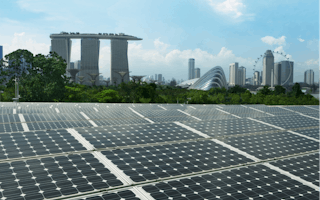More people around the world are moving into cities and this megatrend is set to continue. It is projected that another 2.5 billion people will be added to the urban population by 2050, with close to 90 per cent of this increase concentrated in Asia and Africa. Today, more than half of the world’s urban population and mega-cities can already be found in Asia.
To continue reading, subscribe to Eco‑Business.
There's something for everyone. We offer a range of subscription plans.
- Access our stories and receive our Insights Weekly newsletter with the free EB Member plan.
- Unlock unlimited access to our content and archive with EB Circle.
- Publish your content with EB Premium.
Cities have become magnets for talent, hotbeds of innovation and drivers of economic growth. But it has also produced challenges such as overcrowding, transport congestion and pollution.
To meet the increasingly complex challenges of urbanisation, cities across the world need to adopt an integrated approach to urban solutions. It is at the systems level, that sustainable and comprehensive urban solutions are developed and implemented.
Urban planners also need to think long-term and strategically as short-term quick fixes are unlikely to stand the test of time as cities continue to grow. It is in this context that government and corporate partnerships hold enormous potential for generating innovative and sustainable urban solutions.
Sustainability and smart nation
Singapore offers an interesting example to the development and implementation of urban solutions. Sustainability has been at the heart of Singapore’s national development agenda, long before it became a buzzword. As a small city-state, Singapore has had to develop its own solutions to address constraints such as land and lack of natural resources.
For instance, Singapore overcame its water supply challenge through holistic water management policies, subsidy-free pricing for water, and harnessing technology to diversify its water sources. Therefore, by 2060, Singapore expects to be self-sufficient in water supply, with 55 per cent of its water needs being met by recycled water and 25 per cent from seawater desalination.
Now, Singapore is moving towards solving yet another existential challenge – dependency on energy imports. This has led to Dr Vivian Balakrishnan, Minister for the Environment and Water Resources announcing recently the goal of halving imported energy use for the production of water within the next 10 years, through more efficient water and solar technologies.
In 2014, Singapore also announced its exciting plan to be a Smart Nation, with the intent to leverage technologies more pervasively to improve the lives of Singaporeans. The focus areas include healthcare solutions for the elderly, smart mobility applications, driverless vehicles and nationwide data exchange platform.
With Singapore’s strategic position in the heart of Asia, strong business networks, capabilities in understanding Asian consumers, strong respect for intellectual property, and our reputation for developing and adopting innovative solutions, the city serves as a reference market to develop and export solutions that best serve Asia’s rapidly growing urban population.
Power of public-private partnerships
Partnerships between the government and companies have played a key role in Singapore’s sustainability and urban solutions agenda. To foster such partnerships, Singapore has positioned itself as a ‘Living Laboratory’, by availing its national urban infrastructure to companies both local and foreign, to develop, test and commercialise innovative solutions.
This has been the approach that has enabled Singapore to build up key strengths in its water management solutions, amongst other areas. This has led to the Public Utilities Board (PUB) in Singapore jointly piloting over 150 projects with leading water players such as Suez Environnement, Anaergia and Meidensha, over the past eight years.
To support these partnerships with companies, Singapore has also focused on building capability at the systems level, beyond just individual technologies.
One systems-level capability which Singapore has placed strong emphasis on is urban planning which is especially critical for a land-scarce country.
Other recent systems-level initiatives include the NTU EcoCampus, slated to be the greenest campus in the world, and a renewable energy demonstration platform on Semakau Landfill, that will test the integration of solar, wind, tidal-current, diesel, storage and power-to-gas technologies.
Governments can also play a key role in building up a research and innovation base to support the development of urban solutions. Singapore is investing heavily in research and innovation, and building up strong research centres and a talent base.
Singapore is also exporting its urban solutions expertise overseas, through the development of eco-cities and urban infrastructure. Companies are leveraging Singapore as a springboard for the region, to access markets in China, India and Southeast Asia.
Earlier this year, newly-merged local urban consultancy and planning firm, Surbana Jurong was appointed to master-plan and develop Amaravati, Andhra Pradesh’s new capital city, contributing to PM Narendra Modi’s Smart Cities Mission, which aims to create 100 modern and green cities to help spur economic growth and create jobs in India.
Singapore has become a choice training hub for city mayors from across Asia to better understand how to implement and develop smart-sustainable solutions for their cities.
The way forward
The refreshed Sustainable Singapore Blueprint 2015, which was launched in late 2014 with a new S$1.5 billion commitment, affirms our national vision to build an even more liveable and sustainable future for Singapore.
Plans to develop Singapore as a Smart Nation through leveraging technologies such as sensor networks and data analytics are underway - serving as a critical enabler for sustainability in our city-state.
In addition, the recent Budget statement in February 2015 announced that the field of “smart and sustainable urban solutions” will be one of five growth clusters that will generate new and exciting economic opportunities for Singapore.
This will strengthen our efforts to develop Singapore as the leading cleantech and urban solutions hub in Asia, across the fields of water, environment, clean energy, green buildings and engineering services.
Yeoh Keat Chuan is the Managing Director of the Singapore Economic Development Board (EDB).
This op-ed was originally published in the Eco-Business magazine.









